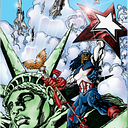It Can Be Done
By Meagan Corrado

Kindergarten is where you learn the basics. Like how to write your name. How to apologize when you mess up. You learn how to use your imagination. And forgive people when they splatter paint on your picture. I still vividly remember my kindergarten classroom. It was active but organized, spontaneous but contained.
Every morning, I walked in the room and hung my book bag in the coat closet. I found my spot on the rug, sat down, and waited for the morning announcements. When the loudspeaker fell silent, my teacher, Ms. Copes would play “The World is a Rainbow,” and we would all sing together. Then we recited the alphabet, pointing to the letters and pictures hung carefully above the chalkboard.
Somewhere on the wall between the alphabet and the loudspeaker- somewhere above the kitchen center and the finger paintings tacked to the bulletin board- there was a sign. I looked at it every day. “It can’t be done,” the sign read. But the apostrophe and the “t” were crossed out. The message that remained was: “It can be done.”

Every afternoon when my teacher kept me up at nap time, challenging me with advanced words and urging me to write in my composition book, I looked up at that sign. It can be done. Ms. Copes taught me how to read. She taught me how to write. She taught me that despite the nagging voice inside of my mind that doubted the fullness of my potential, it can be done.
At pivotal moments in my life, this message and my insatiable drive to write propelled me to keep going. These things helped me when the kids at my new school yanked my braids at recess and wouldn’t let me jump double-dutch. They helped me in moments of danger. Helplessness. Abandonment. They helped me when my bills were due and there wasn’t enough money for groceries. They helped me when I couldn’t envision a way out of emotional darkness. They helped me when my own internal voice said, “You will never be good enough.”
It can be done.
This message and the notebooks I filled with characters, feelings, and experiences were also there with me in happy times. Like when I graduated valedictorian of my university. When I earned my licensure as a Clinical Social Worker. When I developed a program to help trauma survivors heal. This message, these notebooks stayed with me when I earned my doctorate from an Ivy League institution. When I published my seventh book. When I realized that although I am not perfect, I am good enough. It can be done.

My name is Dr. Meagan Corrado. I am a writer. An artist. The creator of the Storiez Trauma Narrative intervention. I am good enough. We are good enough. And whatever the “it” is that we want to do, we can. It can be done.
Now I’m not saying that we are invincible. I’m not saying that we will realize every goal we envision. I’m not saying that a simple message on a classroom wall or a notebook and a pen can solve all of our problems. I’m just saying that we are stronger than we think we are. That we can survive and thrive despite the adversity we face. That writing-expression- helps us navigate life. And that we actually can do many of the things we thought we never could.
Meagan Corrado is a Doctor of Social Work and a Licensed Clinical Social Worker. She developed the Storiez Trauma Narrative intervention, which supports traumatized youth as they create, voice, and honor their narratives. Dr. Meagan’s work is fueled by her own personal experiences with trauma as well as her arts-based clinical work with children, adolescents, and families. To learn more about Storiez visit www.storiezguide.com.

